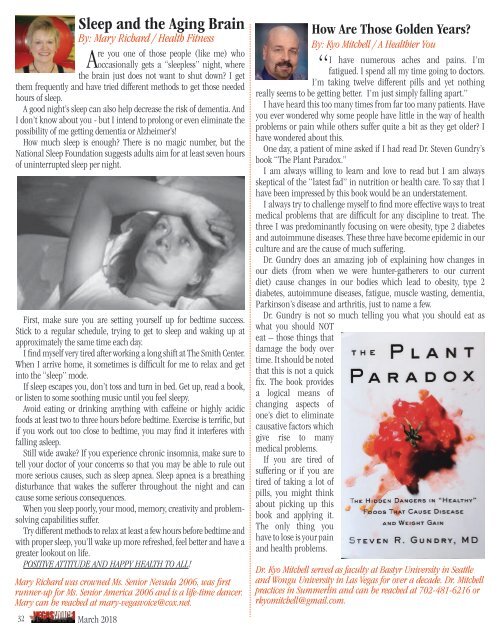Create successful ePaper yourself
Turn your PDF publications into a flip-book with our unique Google optimized e-Paper software.
By: Mary Richard / Health Fitness<br />
Are you one of those people (like me) who<br />
occasionally gets a “sleepless” night, where<br />
the brain just does not want to shut down? I get<br />
them frequently and have tried different methods to get those needed<br />
hours of sleep.<br />
A good night’s sleep can also help decrease the risk of dementia. And<br />
I don’t know about you - but I intend to prolong or even eliminate the<br />
possibility of me getting dementia or Alzheimer’s!<br />
How much sleep is enough? There is no magic number, but the<br />
National Sleep Foundation suggests adults aim for at least seven hours<br />
of uninterrupted sleep per night.<br />
First, make sure you are setting yourself up for bedtime success.<br />
Stick to a regular schedule, trying to get to sleep and waking up at<br />
approximately the same time each day.<br />
I find myself very tired after working a long shift at The Smith Center.<br />
When I arrive home, it sometimes is difficult for me to relax and get<br />
into the “sleep” mode.<br />
If sleep escapes you, don’t toss and turn in bed. Get up, read a book,<br />
or listen to some soothing music until you feel sleepy.<br />
Avoid eating or drinking anything with caffeine or highly acidic<br />
foods at least two to three hours before bedtime. Exercise is terrific, but<br />
if you work out too close to bedtime, you may find it interferes with<br />
falling asleep.<br />
Still wide awake? If you experience chronic insomnia, make sure to<br />
tell your doctor of your concerns so that you may be able to rule out<br />
more serious causes, such as sleep apnea. Sleep apnea is a breathing<br />
disturbance that wakes the sufferer throughout the night and can<br />
cause some serious consequences.<br />
When you sleep poorly, your mood, memory, creativity and problemsolving<br />
capabilities suffer.<br />
Try different methods to relax at least a few hours before bedtime and<br />
with proper sleep, you’ll wake up more refreshed, feel better and have a<br />
greater lookout on life.<br />
POSITIVE ATTITUDE AND HAPPY HEALTH TO ALL!<br />
32 March 20<strong>18</strong><br />
Sleep and the Aging Brain<br />
Mary Richard was crowned Ms. Senior Nevada 2006, was first<br />
runner-up for Ms. Senior America 2006 and is a life-time dancer.<br />
Mary can be reached at mary-vegasvoice@cox.net.<br />
How Are Those Golden Years?<br />
By: Kyo Mitchell / A Healthier You<br />
“<br />
I have numerous aches and pains. I’m<br />
fatigued. I spend all my time going to doctors.<br />
I’m taking twelve different pills and yet nothing<br />
really seems to be getting better. I’m just simply falling apart.”<br />
I have heard this too many times from far too many patients. Have<br />
you ever wondered why some people have little in the way of health<br />
problems or pain while others suffer quite a bit as they get older? I<br />
have wondered about this.<br />
One day, a patient of mine asked if I had read Dr. Steven Gundry’s<br />
book “The Plant Paradox.”<br />
I am always willing to learn and love to read but I am always<br />
skeptical of the “latest fad” in nutrition or health care. To say that I<br />
have been impressed by this book would be an understatement.<br />
I always try to challenge myself to find more effective ways to treat<br />
medical problems that are difficult for any discipline to treat. The<br />
three I was predominantly focusing on were obesity, type 2 diabetes<br />
and autoimmune diseases. These three have become epidemic in our<br />
culture and are the cause of much suffering.<br />
Dr. Gundry does an amazing job of explaining how changes in<br />
our diets (from when we were hunter-gatherers to our current<br />
diet) cause changes in our bodies which lead to obesity, type 2<br />
diabetes, autoimmune diseases, fatigue, muscle wasting, dementia,<br />
Parkinson’s disease and arthritis, just to name a few.<br />
Dr. Gundry is not so much telling you what you should eat as<br />
what you should NOT<br />
eat – those things that<br />
damage the body over<br />
time. It should be noted<br />
that this is not a quick<br />
fix. The book provides<br />
a logical means of<br />
changing aspects of<br />
one’s diet to eliminate<br />
causative factors which<br />
give rise to many<br />
medical problems.<br />
If you are tired of<br />
suffering or if you are<br />
tired of taking a lot of<br />
pills, you might think<br />
about picking up this<br />
book and applying it.<br />
The only thing you<br />
have to lose is your pain<br />
and health problems.<br />
Dr. Kyo Mitchell served as faculty at Bastyr University in Seattle<br />
and Wongu University in Las <strong>Vegas</strong> for over a decade. Dr. Mitchell<br />
practices in Summerlin and can be reached at 702-481-6216 or<br />
rkyomitchell@gmail.com.

















